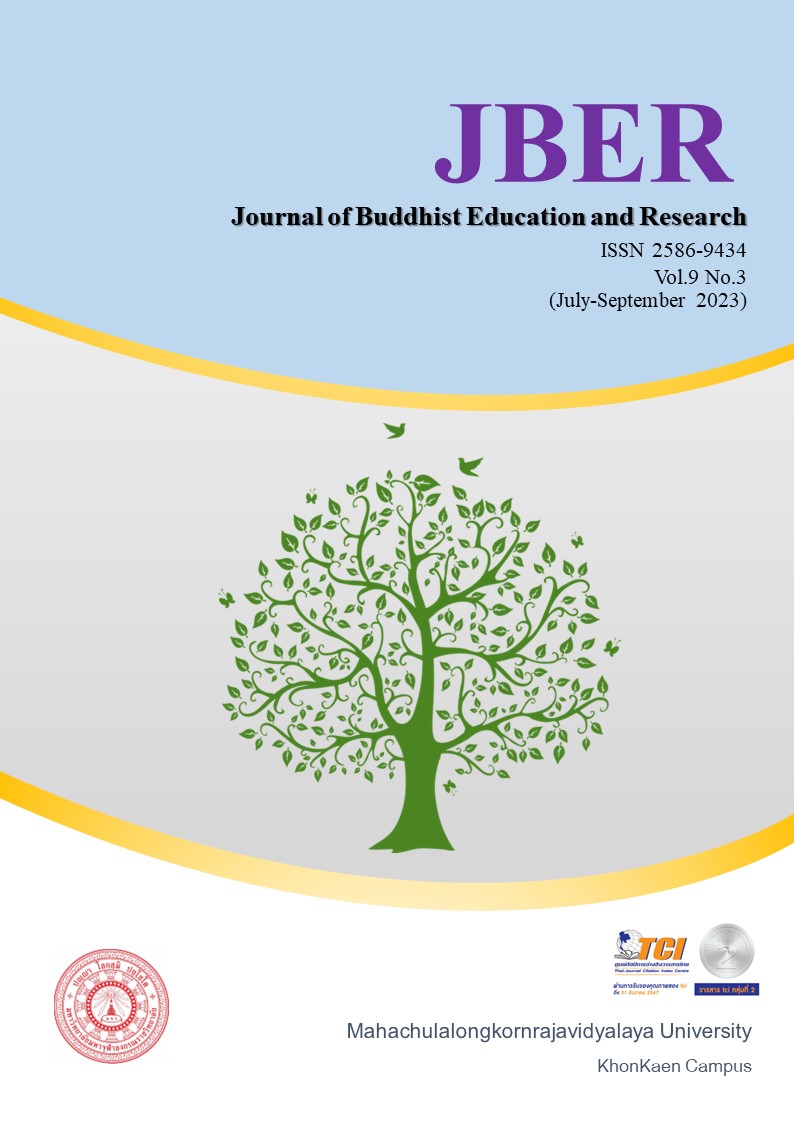FACTORS INFLUENCING RATE OF RETURN OF SECURITIES IN THE STOCK EXCHANGE OF THAILAND UNDER SET WELL-BEING INDEX (SETWB)
Keywords:
Rate of Return, SET Well-Being Index (SETWB)Abstract
the purpose of this study was to explore factors influencing rate of return of securities in the stock exchange of Thailand under SET Well-Being Index (SETWB). In this study used secondary data of companies under the SET Well-Being Index (SETWB). The sample of 26 companies, collected quarterly from the 1st quarter of 2019 to the 4th quarter of 2021. This study examined seven independent variables including share turnover (TURN), size of firm (SIZE), return on asset (ROA), exchange rate between baht and US dollars (EXRATE), net trading of foreign investors (FOREIGNTRADE), debt to equity ratio (DE) and consumer price index (CPI). Multiple Regression analysis was adopted for this study and this data was analyzed by qualitative and quantitative data analysis using the Panel Least Squares Method, Random Effect Regression Model (REM).
The results showed that information factors influencing rate of return of securities in the stock exchange of Thailand under SET Well-Being Index (SETWB) with positively statistical significance level of 0.05 was share turnover (TURN), exchange rate between baht and US dollars (EXRATE) and net trading of foreign investors (FOREIGNTRADE). Meanwhile, consumer price index (CPI) had negative correlation to rate of return of securities in the stock exchange of Thailand under SET Well-Being Index (SETWB) with an R-Square of 0.3470.
References
ดวงกมล วงศ์สายตา. (2557). ปัจจัยที่มีผลกระทบต่อผลตอบแทนหลักทรัพย์กลุ่มอสังหาริมทรัพย์ หมวดพัฒนาอสังหาริมทรัพย์ในตลาดหลักทรัพย์แห่งประเทศไทย. การค้นคว้าอิสระปริญญาบริหารธุรกิจมหาบัณฑิต มหาวิทยาลัยกรุงเทพ.
ตลาดหลักทรัพย์แห่งประเทศไทย. (2558). หุ้นคืออะไร. สืบค้นเมื่อ 14 กันยายน 2564, จาก www.set.or.th.
ตลาดหลักทรัพย์แห่งประเทศไทย. (2562). ดัชนี SET Well-Being Index (SETWB). สืบค้นเมื่อ 16 กันยายน 2564, จาก www.set.or.th.
ตลาดหลักทรัพย์แห่งประเทศไทย. (2562). โอกาสลงทุนในธุรกิจ Well-Being ไทย. สืบค้นเมื่อ 16 กันยายน 2564, จาก www.set.or.th.
ทิพสุคนธ์ วารีดี. (2558). อิทธิพลของมูลค่าการซื้อสุทธิของนักลงทุนต่างชาติและนักลงทุนสถาบันที่มีต่อการเปลี่ยนแปลงของดัชนีราคาหลักทรัพย์ SET50. การค้นคว้าอิสระปริญญาบริหารธุรกิจมหาบัณฑิต มหาวิทยาลัยกรุงเทพ.
ธิธารา รุจิพลพัฒน์. (2561). ปัจจัยทางเศรษฐกิจที่มีผลกระทบต่อดัชนีราคา SET50 Index, น. 1687-1696 ในการประชุมนําเสนอผลงานวิจัยระดับบัณฑิตศึกษา ครั้งที่ 13 ปีการศึกษา 2561. บัณฑิตวิทยาลัย: มหาวิทยาลัยรังสิต.
ธนพร แก้วธำรงค์. (2564). การศึกษาปัจจัยที่มีผลต่ออัตราผลตอบแทนของหลักทรัพย์หมวดอสังหาริมทรัพย์และก่อสร้าง กลุ่มบริการรับเหมาก่อสร้าง, น. 948-956 ในการประชุมทางวิชาการระดับชาติ สาขาบริหารธุรกิจและการบัญชี ครั้งที่ 9. บัณฑิตวิทยาลัย: มหาวิทยาลัยหอการค้าไทย.
นันทกา แซ่เอง. (2559). ปัจจัยทางด้านเศรษฐกิจที่ส่งผลกระทบต่อดัชนีราคาหลักทรัพย์กลุ่มอุตสาหกรรมธุรกิจการเงิน. การค้นคว้าอิสระปริญญาวิทยาศาสตรมหาบัณฑิต สาขาวิชาการเงิน, มหาวิทยาลัยกรุงเทพ.
ภาณุมาศ ยาวีระ. (2563). ปัจจัยที่มีผลต่ออัตราผลตอบแทนของหลักทรัพย์หมวดพัฒนาอสังหาริมทรัพย์ในตลาดหลักทรัพย์แห่งประเทศไทย, น. 2287-2297 ในการประชุมทางวิชาการระดับชาติ สาขาบริหารธุรกิจและการบัญชี ครั้งที่ 8. บัณฑิตวิทยาลัย: มหาวิทยาลัยหอการค้าไทย.
มนตรี พิริยะกุล. (2560). Panel data analysis. วารสารรามคำแหง สาขาวิทยาศาสตร์และเทคโนโลยี, 30 (2): 41-54.
รัชนี รุ่งศรีรัตนวงศ์. (2553). ปัจจัยที่ส่งผลต่อดัชนีราคาตลาดหลักทรัพย์ SET 50. การค้นคว้าอิสระปริญญาบริหารธุรกิจมหาบัณฑิต สาขาวิชาการเงิน, มหาวิทยาลัยหอการค้าไทย.
วิสารัตน์ พันต่วน. (2561). ปัจจัยที่ส่งผลต่อดัชนีราคาหลักทรัพย์ SET 100และความสัมพันธ์ระหว่างตัวแปรต้นและตัวแปรตาม, น. 1460-1470 ในการประชุมนําเสนอผลงานวิจัยระดับบัณฑิตศึกษา ครั้งที่ 13 ปีการศึกษา 2561. บัณฑิตวิทยาลัย: มหาวิทยาลัยรังสิต.
ศูนย์ส่งเสริมการพัฒนาความรู้ตลาดทุน. (2552). ทฤษฎีตลาดทุน. พิมพ์ครั้งที่ 3. กรุงเทพมหานคร: ตลาดหลักทรัพย์แห่งประเทศไทย.
สุทิน ชนะบุญ. (2560). สถิติและการวิเคราะห์ข้อมูลในงานวิจัยเบื้องต้น. กรุงเทพมหานคร.
สำนักงานนโยบายและยุทธศาสตร์การค้า. (2562). ดัชนีราคาผู้บริโภคทั่วไป. สืบค้นเมื่อ 27 เมษายน 2565, จาก https://data.moc.go.th/OpenData/CPIGIndexes.
สำนักงานสภาพัฒนาการเศรษฐกิจและสังคมแห่งชาติ. (2565). ผลิตภัณฑ์มวลรวมในประเทศ ไตรมาสที่ 4/2564. สืบค้นเมื่อ 1 มีนาคม 2565, จาก https://www.nesdc.go.th/ewt_dl_link.php?nid=5176.
อาภาภรณ์ แสวงพรรค. (2564). เงินบาทอ่อนค่า ลงทุนอย่างไร. สืบค้นเมื่อ 27 เมษายน 2565, จาก https://www.setinvest now.com/ th/knowledge/article/321-how-to-invest-during-depreciation.
Clark and Linzer. (2015). Should I Use Fixed or Random Effects?. Political Science Research and Methods, 3 (2): 399-408.
Haneen H. H. Mustafa et al. (2016). The Impact of Capital Structure on Stock Return: Empirical Evidence from Amman Stock Exchange. International Journal of Business and Social Science, 7 (9): 183-196.
John Okey Onoh et al. (2017). Trading Volume and Market Turnover in the Nigerian Capital Market: Implications to Stock Market Returns. International Journal of Economics and Business Management, 3 (1): 91-107.
Mohamad Ali Bataineh et al. (2017). The Effect of Liquidity Risk on Stock Returns: The Case of Amman Stock Exchange during (2004-2013). Arab Journal of Administration, 37 (1): 247-265.
Nurasyikin Jamaludin et al. (2017). Macroeconomic Variables and Stock Market Returns: Panel Analysis from Selected ASEAN Countries. International Journal of Economics and Financial Issues, 7 (1): 37-45.
Vinay T. Datar et al. (1998). Liquidity and stock returns: An alternative test. Journal of Financial Markets, 1 (2): 203-219.





